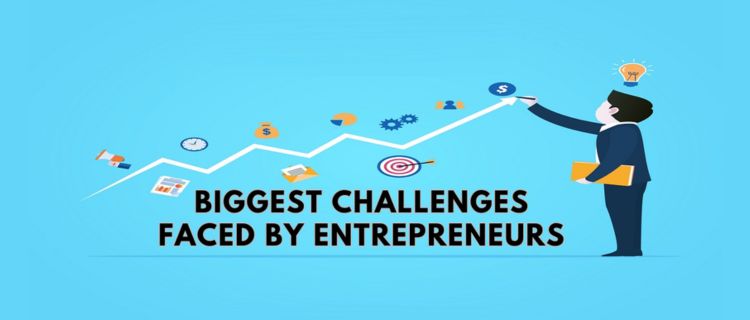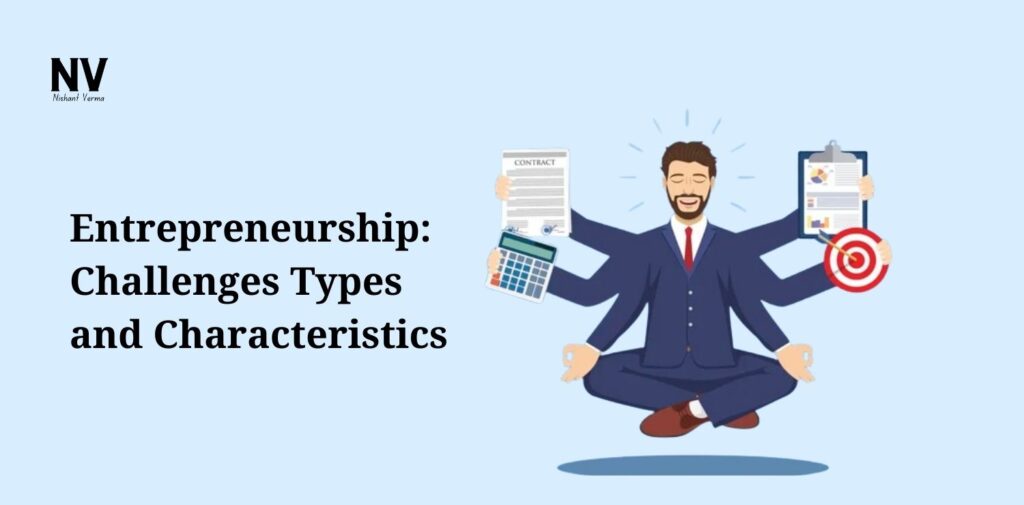Starting a new business is like embarking on an exciting yet challenging adventure. Entrepreneurs are the heroes of this journey, turning their innovative ideas into successful businesses. In this comprehensive article, we will delve into the world of entrepreneurship Journey, breaking down complex concepts into simple language. We’ll explore the entrepreneurship challenges face, why they matter, entrepreneurship types, entrepreneurship characteristics that define them, and various aspects of entrepreneurship, including financing and its impact on the economy.
Entrepreneurship Challenges
Launching a business isn’t always smooth sailing. Entrepreneurs often encounter the following hurdles:
Money Matters: Many entrepreneurs struggle with limited funds. Finding money to start and keep the business running can be a big headache.

- Battling Competition: In a crowded marketplace, competing with established businesses is tough. It’s like trying to stand out in a noisy crowd.
- Dealing with Uncertainty: The future is uncertain, and this uncertainty can make business owners worry about things like changes in the market and fickle customer preferences.
- Time and Effort: Building a business requires hard work, long hours, and a whole lot of commitment. It can be demanding, affecting personal lives.
Why Are Entrepreneurs Important?
Entrepreneurs play a critical role in our society and economy. They matter because they:
- Create jobs for people, helping them make a living.
- Drive innovation by coming up with new ideas and technologies.
- Boost economic growth by starting and growing businesses.
- Please provide us with a wide range of products and services, making our lives better.
Different Entrepreneur Types:
Not all entrepreneurs are the same. There are different types of entrepreneurs, each with a unique focus:

- Small Business Entrepreneurs: These are folks who start and run small local businesses, like your neighbourhood bakery or plumbing service.
- Scalable Startup Entrepreneurs: These entrepreneurs aim for big growth. They want their business to expand rapidly and reach a wider audience.
- Social Entrepreneurs: They are all about making the world a better place. They start businesses that tackle social or environmental problems.
- Corporate Entrepreneurs (Intrapreneurs): Some entrepreneurs work inside big companies. They’re like the innovation agents within the organization, coming up with new ideas and products.
Entrepreneurship Types:
Entrepreneurship Journey can take various forms, including:
- Commercial entrepreneurship: This is all about making money and achieving financial success.
- Social entrepreneurship: Focused on making a positive impact on society and the environment.
- Serial entrepreneurship: Some entrepreneurs can’t stop at just one business; they start several over time.
- Lifestyle entrepreneurship: These entrepreneurs want to enjoy their work and have a good work-life balance.
How to Become an Entrepreneur
If you’re inspired to become an entrepreneur, here’s a simplified roadmap:
- Idea Generation: Think about what kind of business you’d like to start. It’s important to choose something that you’re passionate about and skilled in.
- Business Plan: Create a detailed plan that outlines your goals, who your customers will be, and how you’ll make money.
- Funding: You’ll need money to get started. This can come from your savings, loans, investors, or grants.
- Legal Requirements: Register your business, get the necessary licenses, and follow the rules.
- Launch and Growth: Finally, open your doors and start selling your products or services. Be prepared to learn from your customers and adapt your business to their needs.
Entrepreneurship Financing
Money makes the world go ’round, and that includes the business world. Entrepreneurship Journey have different ways to get the cash they need:
- Self-funding: Use your savings or assets to fund your business.
- Bank loans: Borrow money from a bank or other financial institutions.
- Angel investors: Find people who are willing to invest in your business.
- Venture capital: Get funds from professional investment firms.
- Crowdfunding: Gather small amounts of money from a lot of people through platforms like Kickstarter or Indiegogo.
Entrepreneurship Characteristics
Successful entrepreneurs often have some key entrepreneurship characteristics that help them navigate the entrepreneurship challenges of business:
- Vision: They have a clear idea of what they want to achieve with their business.
- Risk-taking: Entrepreneurs are willing to take calculated risks. They know when to be cautious and when to be daring.
- Resilience: When things don’t go as planned, entrepreneurs don’t give up. They bounce back and keep going.
- Adaptability: They’re like chameleons, changing and adjusting their strategies to fit the situation.
- Creativity: Entrepreneurs have a knack for coming up with fresh, innovative ideas that set them apart from the competition.
Entrepreneurship in Economics
Economics is like the big picture of how money and business work. In this big picture, the entrepreneurship Journey is super important. Here’s why:

- Economic Growth: Entrepreneurs help economies grow by creating businesses that make and sell stuff. When more businesses are successful, the economy gets bigger and stronger.
- Competition: Entrepreneurs bring new ideas and products to the market. This competition is like a friendly race that keeps businesses on their toes, striving to be better and offer more to customers.
- Technological Advancements: Think of entrepreneurs as the driving force behind new gadgets and technologies. They’re the ones who come up with cool stuff like smartphones and electric cars.
- Efficiency: Businesses run by entrepreneurs aim to be efficient, which means they try to do things well and use resources wisely. This is good for the economy because it prevents waste.
- Employment: When businesses grow, they need more hands on deck. That means more jobs for people, which is great for everyone.
Questions for Entrepreneurs
Here are some common questions that aspiring entrepreneurs often have:
How do I come up with a business idea?
Look for problems you can solve or things you’re passionate about.
What are the best ways to secure funding for my startup?
Consider personal savings, loans, investors, or grants.
How can I manage the risks associated with entrepreneurship?
Plan carefully, have a backup plan, and don’t be afraid to ask for help.
What qualities do successful entrepreneurs possess?
Vision, resilience, and adaptability are some key qualities of a successful entrepreneur.
What is the role of mentorship in entrepreneurship?
Mentors can offer guidance and share their experiences to help you avoid common pitfalls.
Conclusion
Entrepreneurship Journey might sound complex, but at its core, it’s about turning dreams into reality. By understanding the entrepreneurship challenges, different types of entrepreneurs, and essential entrepreneurship characteristics, you can navigate this exciting journey. With determination, resilience, and a solid plan, you can transform your vision into a successful business that contributes to society and the economy. So, whether you’re thinking about starting a small local shop or a high-tech startup, remember that entrepreneurship Journey is for everyone, and your journey begins with a single step.




